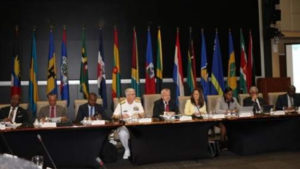 WASHINGTON , United States (CMC) — The United States says the “US-Caribbean Resilience Partnership” which was launched in Miami last week will strengthen the relationship with the region and advance “shared interests” in achieving greater resilience to natural disasters.
WASHINGTON , United States (CMC) — The United States says the “US-Caribbean Resilience Partnership” which was launched in Miami last week will strengthen the relationship with the region and advance “shared interests” in achieving greater resilience to natural disasters.
US Deputy Secretary of State John J Sullivan last Friday led an inter-agency team of United States senior officials and experts to Miami where he hosted ministers and disaster management officials from 18 Caribbean countries, the Caribbean Disaster Emergency Management Agency (CDEMA), and the Regional Security System (RSS) in launching the new US-Caribbean Resilience Partnership.
In a statement on Tuesday, the State Department said that the new partnership involves several initiatives including understanding risk and enabling action; building resilient communities; and improving disaster response.
“The United States, through funding provided by the United States Agency for International Development (USAID), will roll out storm surge mapping to additional countries in the Caribbean, enabling governments to assess and mitigate flooding risks from tropical cyclones and tsunamis,” the State Department said, adding that Washington, through the National Oceanic and Atmospheric Administration, will continue to offer weather information sharing capabilities with Caribbean countries.
Washington said that regarding space technologies for risk reduction and resilience, it will, through the National Aeronautics and Space Administration, make geospatial information “openly accessible, understandable, and readily useable with Caribbean partners to ensure the region’s decision-makers and stakeholders have the tools necessary to implement sustainable resilience policies”.
The State Department said officials from the Caribbean and the United States will continue high-level policy dialogues and collaboration on the use of Earth observation tools to build resilience and reduce risk during the “Understanding Risk: Caribbean Conference” in Barbados on May 27, and at the NASA-led workshop on vulnerability and exposure of infrastructure in Puerto Rico, August 6-8.
Washington said it would also be “an active partner” when Jamaica hosts the first United Nations International Strategy for Disaster Reduction Americas and Caribbean Regional Platform for Disaster Risk Reduction meeting in 2020.
The United States, through USAID and in partnership with the US Geological Survey, will offer technical assistance to The University of the West Indies’ Seismic Research Centre for Dominica and other Caribbean countries to build technical skills in monitoring volcanoes via the Volcano Disaster Assistance Programme.
“This assistance will help Caribbean countries continue improving their ability to provide early warning,” the State Department said, adding that the United States supports resilience to terrestrial hazards through the installation of seismic stations for the Caribbean Tsunami Early Warning System, as well as technical consultations and capacity building on coastal inundation and erosion hazards.
Through the Inter-American Foundation, the State Department said the US plans to provide US$650,000 in grants to eastern Caribbean community organisations to improve disaster mitigation and resilience.
Under the Caribbean Energy Security Initiative, the Department of State said it is working toward “resilient, cost-effective and secure energy redevelopment efforts” in support of disaster recovery in Antigua and Barbuda and Dominica.
Building on this effort, US and Caribbean officials announced the Advancing Caribbean Energy Resilience (ACER) Workshop to be organised by the US Department of Energy in partnership with the Department of State and the Organization of American States in Puerto Rico, May 2-3.
In addition, Washington will offer skills development training to the Caribbean Red Cross National Societies and to their volunteers, and will also work with CDEMA and RSS to strengthen regional response capabilities.
The State Department said ongoing USAID programmes in the Caribbean “help islands prepare for their annual hurricane seasons”.
